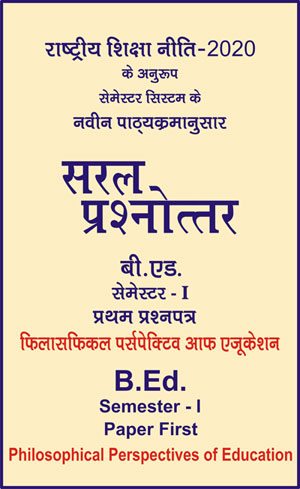|
बी एड - एम एड >> बी.एड. सेमेस्टर-1 प्रश्नपत्र-I - फिलासफिकल पर्सपेक्टिव आफ एजुकेशन बी.एड. सेमेस्टर-1 प्रश्नपत्र-I - फिलासफिकल पर्सपेक्टिव आफ एजुकेशनसरल प्रश्नोत्तर समूह
|
|
|||||||
बी.एड. सेमेस्टर-1 प्रश्नपत्र-I - फिलासफिकल पर्सपेक्टिव आफ एजुकेशन (अंग्रेजी भाषा में)
Question- Point out the impact of idealism in the Contemporary field of education.
Or"Idealism has been left aside in the contemporary field of education, yet, it has most ancient school that has influenced education through its history". Clarify this statement in your words.
Answer -
Impact Of Idealism On Contemporary Education
Though idealism may have been very much left aside in the contemporary field of education, it is undoubtedly the most ancient school which has influenced education throughout its history. Even now the following points may be noted concerning the influence of idealism in the contemporary field of education.
-
Wider and higher Aims : As the nationalist aims of education are giving place to humanist aim, idealism has become more relevant to the modern educationist. The idealists present the highest and the widest aims and ideals of education summed up in such terms as self-realization, man-making, development of personality, harmony of man and nature, realization of truth, goodness and beauty and realization of heaven upon earth. All these aims have been emphasized by contemporary philosophers of education in East and West.
-
The ideal Teacher : In this age of science, the model of ideal teacher is still presented by idealism. Whatever may be said about the need of practical education and the utilization of scientific means, no teacher can influence the educands without some sort of idealism. Teaching involves communication which very much depends upon rapport between the teacher and the taught.
-
Integrated and Multisided Curricula : While other systems of philosophy of education lay emphasis upon science and technology, the idealists point out the eternal value of humanities, social sciences, art and literature. In fact, they lay emphasis upon and integrated curricula which may include every branch of knowledge. Thus, the idealist curricula is the most liberal, the most dynamic, the most multisided and henceforth, most conducive to the cultural development of the individual and society.
-
Moral Education : Thinkers everywhere today lament at the general loss of moral character. Everywhere development of the world for future is considered as an urgent need, to save the world from future catastrophe. The idealists explain the aims and means of education.
-
Self-Discipline : The idealists concept of freedom as self-discipline has come to stay. It prescribes central place to the child in the system of education and lays emphasis upon natural development. Natural development requires freedom but freedom cannot be enjoyed without self-discipline. Contemporary educationists unanimously accept the need of freedom and discipline and agree that self-discipline is the only way for proper development.
-
Psychological Methods : Even the pragmatists agree that some sort of idealism is necessary for teaching, particularly that of humanities, art and literature. The idealists include instruction, activity and experience in their methods of teaching. The idealist method of teaching is most effective in religious and moral teaching. It is a solid ground for character building and realization of intimate relations between the teacher and the taught.
|
|||||

 i
i 










